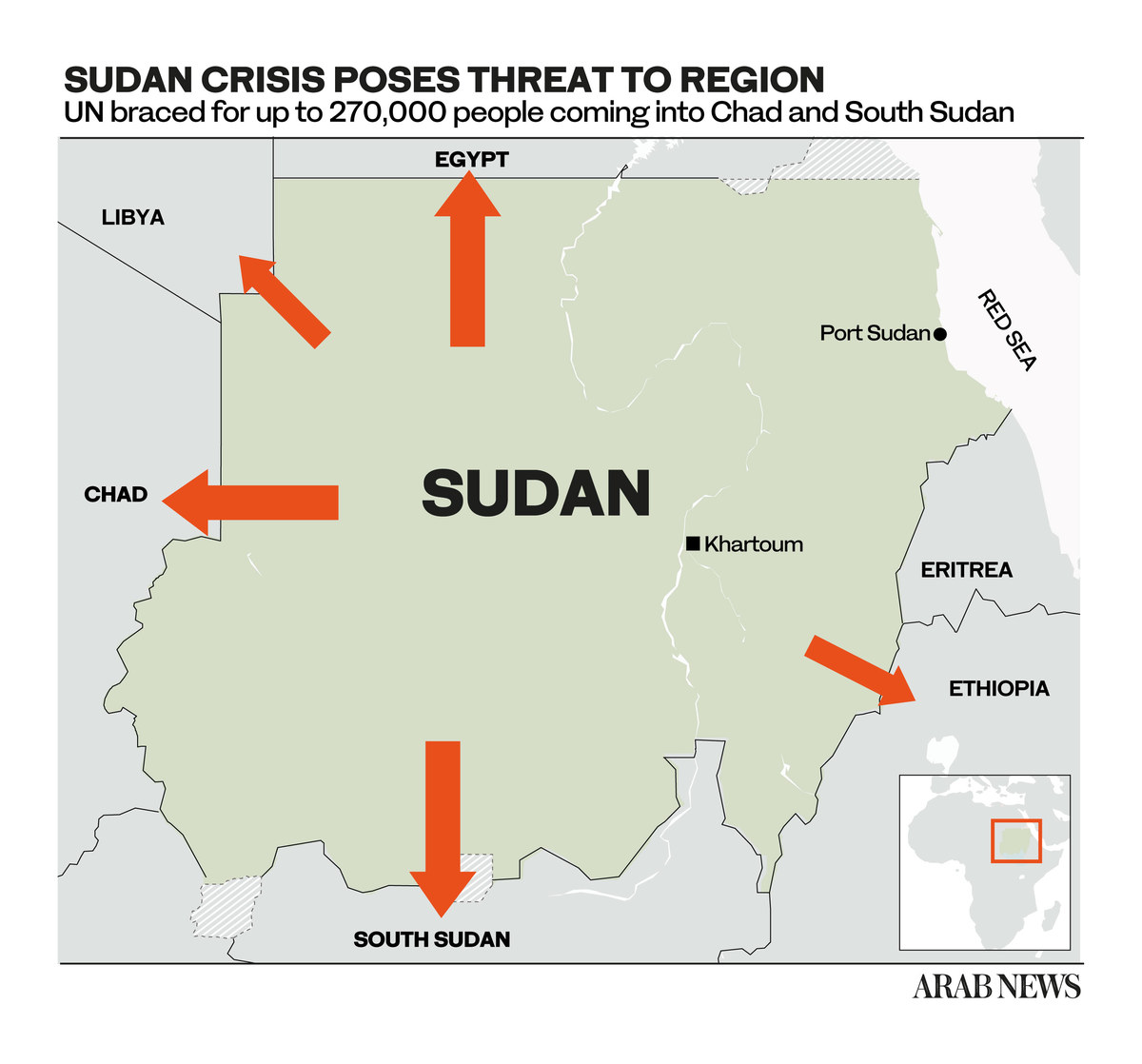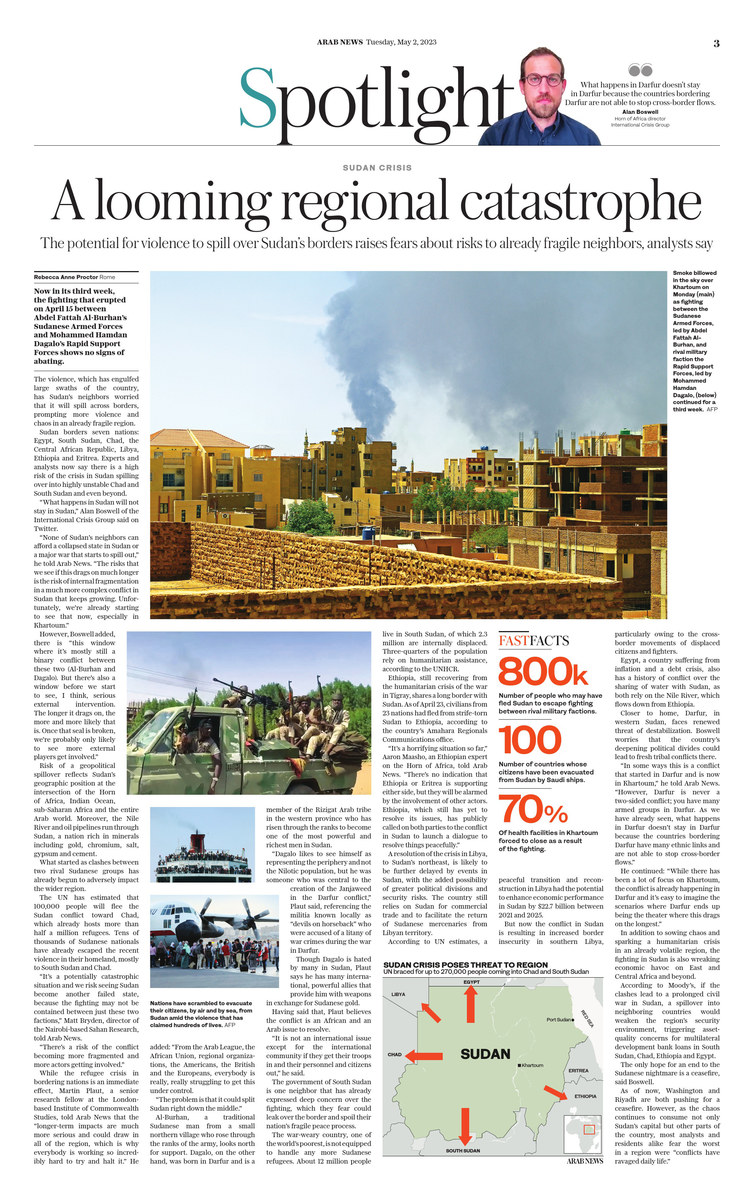
ROME: Now in its third week, the fighting that erupted on April 15 between Abdel Fattah Al-Burhan’s Sudanese Armed Forces and Mohamed Hamdan Dagalo’s Rapid Support Forces shows no signs of abating.
The violence, which has engulfed large swathes of the country, has Sudan’s neighbors worried that it will spill across borders, triggering off more violence and chaos in an already fragile region.
The point was underscored on Monday by the UN resident and humanitarian coordinator in Sudan, Abdou Dieng, who told a briefing of member states: “The regional spillover effect of the crisis is a serious concern.”
Sudan borders seven nations — Egypt, South Sudan, Chad, the Central African Republic, Libya, Ethiopia and Eritrea. “What happens in Sudan will not stay in Sudan,” Alan Boswell of the International Crisis Group said on Twitter.
“None of Sudan’s neighbors can afford a collapsed state in Sudan or a major war that starts to spill out,” he told Arab News. “The risks that we see, if this drags on much longer, is the risk of internal fragmentation in a more complex conflict in Sudan that keeps growing. Unfortunately, we’re already starting to see that now, especially in Khartoum.”
However, Boswell added, there is “this window where it’s mostly still a binary conflict between these two (Al-Burhan and Dagalo). But there’s also a window before we start to see, I think, serious external intervention. The longer it drags on, the more and more likely that is. Once that seal is broken, we’re probably only likely to see more external players get involved.”
Risk of a geopolitical spillover reflects Sudan’s geographic position at the intersection of the Horn of Africa, Indian Ocean, sub-Saharan Africa and the entire Arab world. Moreover, the Nile River as well as oil pipelines run through Sudan, a nation rich in minerals including gold, chromium, salt, gypsum and cement.
What started as clashes between two rival Sudanese groups has already begun to adversely impact the wider region.
The UN has estimated that 100,000 people will flee the Sudan conflict toward Chad, which already hosts over half a million refugees. Tens of thousands of Sudanese nationals have already escaped the recent violence in their homeland, mostly to South Sudan and Chad.
“It’s a potentially catastrophic situation and we risk seeing Sudan become another failed state, because the fighting may not be contained between just these two factions,” Matt Bryden, director of the Nairobi-based Sahan Research, told Arab News. “There’s a risk of the conflict becoming more fragmented and more actors getting involved.”

While the refugee crisis in bordering nations is an immediate impact, Martin Plaut, senior research fellow at the London-based Institute of Commonwealth Studies, told Arab News that the “longer-term impacts are much more serious and could draw in all of the region, which is why everybody is working so incredibly hard to try and halt it.”
He added: “From the Arab League, the African Union, regional organizations, the Americans, the British and the Europeans, everybody is really, really struggling to get this under control.
“The problem is that it could split Sudan right down the middle.”

Sudanese refugees from the Tandelti area shelter under a tree in Koufroun, Chad, near Echbara, on April 30, 2023. (AFP)
Al-Burhan, a traditional Sudanese man from a small northern village who rose through the ranks of the army, looks north for support. Dagalo, on the other hand, was born in Darfur and is a member of the Rizigat Arab tribe in the western province who has risen through the ranks to become one of the most powerful and richest men in Sudan.
“Dagalo likes to see himself as representing the periphery and not the Nilotic population, but he was someone who was central to the creation of the Janjaweed in the Darfur conflict,” Plaut said, referencing the militia known locally as “devils on horseback” who were accused of a litany of war crimes during the war in Darfur.
Though Dagalo is hated by many in Sudan, Plaut says he has many international powerful allies that provide him weapons in exchange for Sudanese gold.
Having said that, Plaut believes the conflict is an African and an Arab issue to resolve. “It is not an international issue except for the international community if they get their troops in and their personnel and citizens out,” he said.

Evacuees stand on a ferry as it transports some 1900 people across the Red Sea from Port Sudan to the Saudi King Faisal navy base in Jeddah, on April 29, 2023, during mass evacuations from Sudan. (AFP)
The government of South Sudan is one neighbor that has already expressed deep concern over the fighting, which they fear could leak over the border and spoil the country’s fragile peace process.
The war-weary country, one of the world’s poorest, is not equipped to handle any more Sudanese refugees. Around 12 million people live in South Sudan, of which 2.3 million are internally displaced. Three-quarters of the population rely on humanitarian assistance, according to the UNHCR.
As Robert Bociaga wrote in a recent report in Arab News: “Sudan exports crude oil produced by South Sudan. Any disruption to this trade arrangement could lead to economic instability for the young republic, which has already suffered the knock-on effects of recent tribal uprisings in eastern Sudan.”
One direct result of the conflict is the price of Sudan’s oil exports, which fell on Friday from $100 per barrel to $70.
FASTFACTS
- 5,197 People evacuated by Saudi ships from Port Sudan as of Sunday.
- 800k + People who may have fled Sudan to escape fighting between military factions.
- 70% Health facilities in Khartoum forced to close as a result of the fighting.
Ethiopia, still recovering from the humanitarian crisis of the war in Tigray, shares a long border with Sudan. As of April 23, civilians from 23 nations have fled strife-torn Sudan to Ethiopia, according to the country’s Amahara Regionals Communications office.
“There’s no indication that Ethiopia or Eritrea is supporting either side, but they will be alarmed by the involvement of other actors,” Aaron Maasho, an Ethiopian Horn of Africa expert, told Arab News. “Ethiopia, which still has yet to resolve its issues, has publicly called on both parties to the conflict in Sudan to launch a dialogue to resolve things peacefully.”

Sudanese migrants carrying their luggage stand in line at the Mitiga airport in the Libyan capital Tripoli, before flying back to their country voluntarily, on December 15, 2021. (AFP)
A resolution of the crisis in Libya, to Sudan’s northeast, is likely to be further delayed by events in Sudan, with the added possibility of greater political divisions and security risks. The country still relies on Sudan for commercial trade and to facilitate the return of Sudanese mercenaries from Libyan territory.
According to UN estimates, the result of a peaceful transition and reconstruction in Libya has the potential to enhance economic performance in Sudan by $22.7 billion over the course of 2021 to 2025. But now the Sudan conflict is leading to increased border insecurity in southern Libya, particularly owing to the cross-border movements of displaced citizens and fighters.
Egypt, a country suffering from inflation and a debt crisis, also has a history of conflict over sharing water with Sudan, as both rely on the Nile River which flows down from Ethiopia.

Refugees cross into Egypt through the Argeen land port with Sudan on April 27, 2023. (AFP)
Closer to home, Darfur, in western Sudan, faces renewed threat of destabilization. Boswell worries that the country’s deepening political divides could lead to fresh tribal conflicts there.
“In some ways this is a conflict that started in Darfur and is now in Khartoum,” he told Arab News. “However, Darfur is never a two-sided conflict; you have many armed groups in Darfur. As we have already seen, what happens in Darfur doesn’t stay in Darfur because the countries bordering Darfur have many ethnic links and are not able to stop cross-border flows.”
He continued: “While there has been a lot of focus on Khartoum, the conflict is already happening in Darfur and it’s easy to imagine the scenarios where Darfur ends up being the theater where this drags on the longest.”
In addition to sowing chaos and sparking a humanitarian crisis in an already volatile region, the fighting in Sudan is also wreaking economic havoc on East and Central Africa and beyond.
According to Moody’s, if the clashes lead to a prolonged civil war in Sudan, a spillover into neighboring countries would weaken the region’s security environment, triggering asset quality concerns for multilateral development banks loans in South Sudan, Chad, Ethiopia and Egypt.

The only hope for an end to the Sudanese nightmare is a ceasefire, said Boswell.
As of now, Washington and Riyadh are both pushing for a ceasefire. But as large parts of Sudan continue to be wracked by violence and lawlessness, analysts and residents alike fear the worst for the wider region, where “conflicts have ravaged daily life.”





























